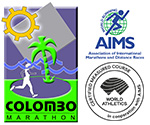The world running organisation the Association of International Marathons and Distance Races (AIMS) is delighted to announce that the Ethiopian athlete Netsanet Gudeta has been recognised with the AIMS World Record Award.
Netsanet set a women-only Half Marathon World Record of 1:06:11 at the IAAF/Trinidad Alfonso World Half Marathon Championships Valencia 2018 on 24 March 2018. Netsanet beat the previous record of 1:06:25 set by Lornah Kiplagat (Kenya), a record that has stood since 2007.
Ermias Ayele, Race Director of the Great Ethiopian Run and Haile Gebreselassie, Founder of the Great Ethiopian Run presented Netsanet with her award as part of a pre-race media event in advance of the Great Ethiopian run on Sunday.
The time of 1:06:11 has been officially recognised as the world record by the IAAF (International Association of Athletics Federations) and by AIMS (Association of International Marathons and Distance Races which represents over 447 distance running events in 117 countries and territories). AIMS set the world record criteria for performances on the road later adopted by the IAAF. AIMS have been awarding athletes in recognition of world record breaking performances since 1985.
AIMS President Paco Borao commented: “It is great to see Netsaet’s record breaking achievement recognised with the AIMS World Record Award. I would like to extend the congratulations of AIMS, our members and sponsors”.
Netsanet Gudeta commented: “I am very pleased to be recognised with this award. I would like to thank AIMS for presenting me with this trophy on behalf of their members and sponsors around the world. It is very special for me to receive this award in Ethiopia.”
Ermias Ayele, Race Director of the Great Ethiopian Run commented: “We are very proud to welcome Netsanet to our race and host her presentation here, where she has competed in the past, including winning the 2013 Great Ethiopian Run 10km International. Netsanet is an inspiration to women and girls in Ethiopia and the entire world.”
AIMS proposed the technical criteria for World Records on the road that the IAAF has adopted for prescribed distances.
The full conditions to be satisfied are:
a) The event must be sanctioned either by the IAAF and/or the National Federation and conducted under IAAF Rules.
b) The athlete achieving the IAAF Road World Record must be eligible to compete under IAAF Rules.
c) The course must be measured by an “A” or “B” IAAF/AIMS approved measurer as defined in IAAF Rule 240.3.
d) The start and finish points on a course, measured along a straight line between them, shall not be further apart than 50% of the race distance.
e) The decrease in elevation between the start and finish shall not exceed an average of one in a thousand, i.e. 1m per km.
f) Either the course measurer that certified the course or another “A” or “B” measurer in possession of the complete measurement data and maps must validate that the course measured was the course run by riding in the lead vehicle.
g) The course must be verified on site (i.e. within two weeks before, on the day of the race or as soon as practical after the race), preferably by a different IAAF/AIMS “A” measurer from the one that did the original measurement.
h) The athlete must undergo a doping control on the date of the race.
i) For the Road Relay, the race should be run in stages of 5km, 10km, 5km, 10km, 5km, 7.195km.
Road World Records set at intermediate distances within a race must comply with the above conditions and be timed according to IAAF Rules. The intermediate distances must have been measured and marked during the course measurement.
It is recommended that Member Federations adopt the Rules of the IAAF for the conduct of their own athletic competitions.

